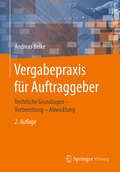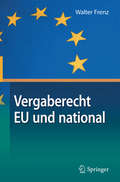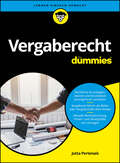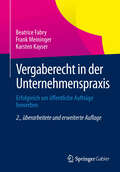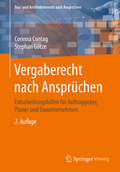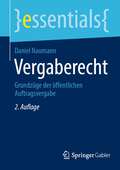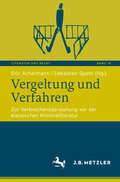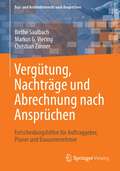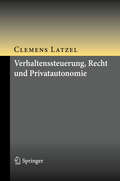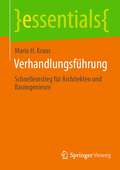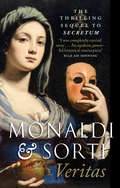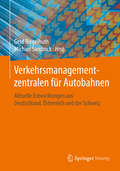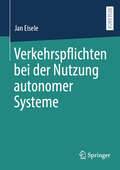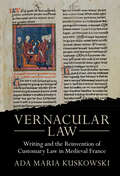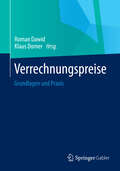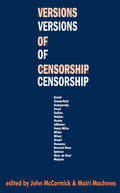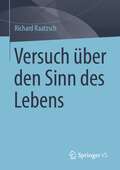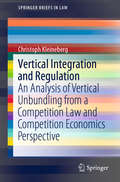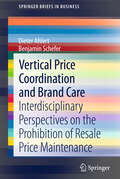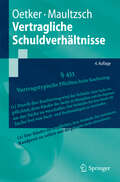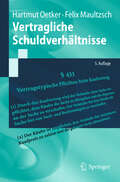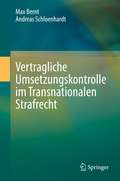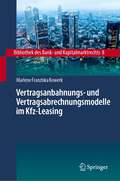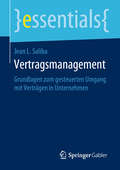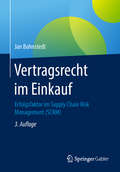- Table View
- List View
Vergabepraxis für Auftraggeber: Rechtliche Grundlagen - Vorbereitung - Abwicklung
by Andreas BelkeAusschreibungs- und Vergabeverfahren von Bauleistungen bergen auch für den ausschreibenden Planer viele Tücken und Fallstricke. Dieses Praxisbuch erklärt die Verfahren und die Vorgehensweisen Schritt für Schritt und stellt anschaulich die Bezüge zu den relevanten Gesetzen und Verordnungen her (VOB/A und HOAI). Ein gut strukturierter Leitfaden für die fehlerfreie und regelkonforme Durchführung von Ausschreibung und Vergabe unter Berücksichtigung der VOB 2009.
Vergaberecht EU und national
by Walter FrenzDas Buch zeigt die unionsrechtlichen Grundlagen des Vergaberechts auf und behandelt EU- und nationales Recht gemeinsam mit Schwerpunkt auf den vielfältigen Verflechtungen.Das Vergaberecht kommt trotz der umfassenden Novellierung nicht zur Ruhe: Können nunmehr strategische Ziele wie Frauenförderung und Tariftreue unbegrenzt als Leistungskriterien eingesetzt werden? Unter welchen Voraussetzungen ist die – nicht geregelte – Hoheitsübertragung nach dem EuGH-Urteil Remondis ausschreibungsfrei? Wann gilt dies für nachträgliche Vertragsänderungen? Wann kommen Verhandlungsverfahren, wettbewerblicher Dialog und Innovationspartnerschaft zum Einsatz? Wie funktioniert die Compliance im Vergaberecht, um einen Bieterausschluss zu vermeiden (Vorlage VK Südbayern an den EuGH)? Alle diese Fragen sind vor allem europarechtlich geprägt. Das deutsche Vergaberecht kann, wie führende Vergaberechtler immer wieder betonen, nur vollständig erfasst werden, wenn der unionsrechtliche Hintergrund präsent ist. Diese Verknüpfung leistet dieses Handbuch.
Vergaberecht für Dummies (Für Dummies)
by Jutta PertenaisDas Einmaleins des Vergaberechts Das Vergaberecht kann wie eine hohe Hürde wirken, wenn Sie Aufträge von der öffentlichen Hand erhalten wollen. Jutta Pertenaïs nimmt Ihnen die Furcht vor diesem Gesetzeskonvolut. Sie erklärt zuerst die Grundlagen des Vergaberechts, den Zweck, die Grundsätze und die Anwendungsbereiche. Danach erläutert sie notwendige Formalitäten und die Struktur des Vergabeverfahrens. Sie erfahren, was Sie bei der Angebotserstellung beachten müssen und was Sie über Haftung und strafrechtliche Konsequenzen wissen müssen. Anhand von Beispielfällen mit Lösungen können Sie Ihr frisch erworbenes Wissen prüfen. Sie erfahren Was das Vergaberecht überhaupt regelt Was es mit Unter- und Oberschwellenbereichen auf sich hat Welche Konsequenzen die unsachgemäße Durch-führung eines Vergabe-verfahrens haben kann
Vergaberecht in der Unternehmenspraxis
by Karsten Kayser Frank Meininger Beatrice FabryIn Deutschland erteilen öffentliche Auftraggeber jedes Jahr mehr als eine Million Aufträge über Bau-, Dienst- und Lieferleistungen in einer Gesamthöhe von rund 250 Milliarden Euro. Die erfahrenen Rechtsanwälte und Partner der Kanzlei Menold Bezler führen Unternehmen in die Grundlagen des Vergaberechts sowie das Vergabeverfahren von Angebotsphase über Angebotsprüfung bis hin zur Zuschlagserteilung ein.
Vergaberecht nach Ansprüchen: Entscheidungshilfen für Auftraggeber, Planer und Bauunternehmen (Bau- und Architektenrecht nach Ansprüchen)
by Corinna Contag Stephan GötzeDie öffentliche Hand kann keine Bauleistung vergeben, ohne dass dafür die Regelungen des Vergaberechts eingehalten werden müssen. Die aus einem komplexen Geflecht von Normen und Vorschriften resultierenden Rechte und Pflichten bei der Vergabe von Aufträgen werden Praktikern anhand von Abläufen, Handlungsoptionen und Beispielen in den verschiedenen Verfahrensstadien anschaulich erläutert. Zusätzlich wird der mögliche Rechtsschutz vor den Vergabekammern und Gerichten sowohl ausgerichtet auf den Erhalt der Zuschlagschance dargestellt, aber auch Anspruchsgrundlagen und Voraussetzungen, unter denen Schadensersatzforderungen geltend gemacht werden können, beleuchtet. So werden potentielle Auftragnehmer darin unterstützt, ihre Chancen auf den Angebotszuschlag zu maximieren. Auftraggebern werden Wege zur effektiven und erfolgreichen Durchführung von Ausschreibungen aufgezeigt. Ausgehend von den Gestaltungsmöglichkeiten der Beteiligten im jeweiligen Verfahrensstadium wird dargestellt, welche Maßnahmen zu welchem Zeitpunkt ergriffen werden können, um das jeweilige Ziel zu erreichen.
Vergaberecht: Grundzüge der öffentlichen Auftragsvergabe (essentials)
by Daniel NaumannDaniel Naumann gibt mit diesem essential eine komprimierte Einführung in das dynamische und spannende Rechtsgebiet des Vergaberechts an die Hand – einem Rechtsgebiet, dessen praktische Bedeutung stetig zunimmt. Darüber hinaus vermittelt der Autor die wichtigsten „Basics“ der öffentlichen Auftragsvergabe, insbesondere unter Verwendung zahlreicher Abbildungen und Übersichten.
Vergeltung und Verfahren: Zur Verbrechensdarstellung vor der klassischen Kriminalliteratur (Literatur und Recht #16)
by Eric Achermann Sebastian SpethDiesem Band geht es dezidiert nicht darum, eine teleologische Großerzählung zu schreiben, mit der die Erfolgsgeschichte von Kriminalroman und Detektivgeschichte unter Missachtung der jeweiligen historischen Besonderheiten nach vorne verlängert würde. Stattdessen ist das Ziel, alternative Modelle der Erzählung und Darstellung von Kriminalität in verschiedenen Gattungen zu untersuchen – immer unter dem konstitutiven Einbezug des jeweils geltenden rechtlichen Rahmens. Das Spektrum reicht von der klassischen Antike über Mittelalter und Frühe Neuzeit bis an den Punkt, an dem sich das heute vorherrschende Genre-Verständnis mit dem Aufkommen der Detektivfigur verfestigt und verengt.
Vergütung, Nachträge und Abrechnung nach Ansprüchen: Entscheidungshilfen für Auftraggeber, Planer und Bauunternehmer (Bau- und Architektenrecht nach Ansprüchen)
by Christian Zanner Markus G. Viering Birthe SaalbachKaum ein Bauprojekt wird ohne einen bzw. mehrere Nachträge abgeschlossen. Wie erstelle ich diese? Wie prüfe ich sie? Welche Anspruchsgrundlagen gibt es dazu? Was sind eigentlich tatsächlich erforderliche Kosten, wann sind sie maßgebend und wie werden sie ermittelt? Diese und zahlreiche weitere Fragen stellen sich nicht nur die erfahrenen Baupraktiker, sondern auch diejenigen, die am Beginn ihrer Karriere stehen oder die gar noch studieren.Praxisnah und umfassend werden die aus einem Bauvertrag – gleich ob nach VOB/B oder BGB – resultierenden Rechte und einschlägigen Regelungen von den Herausgebern und Mitautoren aus den unterschiedlichen Disziplinen der Bau-Juristerei und den Ingenieurwissenschaften dargestellt. Besonders anschaulich werden die Inhalte durch Ablaufdiagramme und Grafiken vermittelt. Beispiele und Praxistipps machen diese Publikation zu einem hilfreichen Nachschlagwerk für die tägliche Nutzung.
Verhaltenssteuerung, Recht und Privatautonomie
by Clemens LatzelDieses Buch überträgt psychologische und verhaltensökonomische Erkenntnisse über die menschliche Entscheidungsfindung und ihre Steuerbarkeit (vor allem durch Anreize, Überzeugung und äußere Umstände, also Nudging) in die Rechtswissenschaft und zeigt, wie das Recht mit diesem Wissen optimiert werden kann. Während der Homo oeconomicus als Standardmodell der Wirtschaftswissenschaften bereits durch einen empirisch fundierten Modellpluralismus abgelöst wurde, harrt das zivilrechtliche Selbstbestimmungsdogma noch einer empirischen Erdung. Außerdem erklärt dieses Buch – insoweit auch für die Sozialwissenschaften interessant – die Funktionsweisen des Rechts und seiner spezifischen Steuerungsinstrumente und zeigt deren Rahmenbedingungen auf. Aus traditioneller zivilrechtlicher Sicht ist hierbei zu rechtfertigen, warum Recht überhaupt das Verhalten von Menschen steuern darf und ausgerechnet die Privatautonomie als Hort des Liberalismus ihre Indienstnahme für politische Zwecke (Materialisierung) ertragen muss.
Verhandlungsführung: Schnelleinstieg für Architekten und Bauingenieure (essentials)
by Mario H. KrausVerhandlungen spielen in vielen Berufsfeldern eine Rolle. Erfolgreich zu verhandeln ist eine Sache der Vorbereitung, der Übung und auch der Wertschätzung von Mitmenschen. Dieser Leitfaden bietet eine Zusammenfassung bewährten Wissens für die schnelle Anwendung.
Veritas: The Thrilling Sequel to Secretum
by Rita Monaldi Francesco SortiA spy uncovers a political plot in 18tn century Vienna in this sequel to the acclaimed historical thriller Secretum—&“another tour-de-force of derring do&” (Historical Novel Society).Vienna, 1711. Atto Melani, a spy in the service of Louis XIV, arranges for his faithful helper to relocate from a Roman slum to the imperial court in Vienna. There, Atto enlists his help in a secret mission to bring about the end of the war between France and Austria. Meanwhile, a Turkish delegation has arrived in Vienna for talks with Emperor Joseph I—despite the fact that Austria is supposed to be at peace with the Ottoman Empire. When the emperor suddenly falls ill with smallpox and students are targeted by a serial killer, some fear that a centuries-old power struggle has been reignited. Can Atto and his helper prevent Europe from descending into all-out conflict? An unfinished palace known as the Place with No Name, an exotic menagerie and a fantastical Flying Ship are just some of the ingredients of this baroque spy novel.
Verkehrsmanagementzentralen für Autobahnen: Aktuelle Entwicklungen aus Deutschland, Österreich und der Schweiz
by Michael Sandrock Gerd RiegelhuthDas Buch zeigt anhand ausgewählter Entwicklungen aus Deutschland, Österreich und der Schweiz, wie moderne Verkehrsmanagementzentralen als Nukleus intelligenter Verkehrssysteme zur Sicherstellung einer bedarfsgerechten Mobilität beitragen können. Dabei gilt es sich an Zielen wie Verkehrssicherheit, Umwelt- und Klimaschutz sowie Verkehrseffizienz zu orientieren. Wesentliches Element ist die Umsetzung von Verkehrsmanagementstrategien auf Autobahnen bei gleichzeitiger Interaktion mit dem regionalen Umfeld in Ballungsräumen mit seinen komplexen Strukturen durch die Aufgabenwahrnehmung bei unterschiedlichen Verkehrs- und Aufgabenträgern. Beispiele aus deutschen Bundesländern und deutschsprachigen Nachbarländern veranschaulichen die Entwicklungen und Lösungswege, um sicheres und planbares Reisen auch in Zukunft zu ermöglichen.
Verkehrspflichten bei der Nutzung autonomer Systeme
by Jan EiseleDas Buch behandelt die Frage nach dem Bestehen von Verkehrspflichten des Nutzers autonomer Systeme. Es geht also um: 1) Autonome Systeme: Das sind besonders selbständige künstliche Intelligenzen. 2) Die Nutzer solcher Systeme: Die Frage der Haftung für künstliche Intelligenz beschränkt sich sowohl in der Wissenschaft als auch beim Gesetzgeber auf den Hersteller. Kontrastierend dazu beschäftigt sich die Arbeit mit der Haftung des Nutzers. 3) Verkehrspflichten: Die Arbeit rekurriert als Anknüpfung für eine mögliche Haftung auf die Verkehrspflichten und dazugehörige Bereiche.
Vernacular Law: Writing and the Reinvention of Customary Law in Medieval France (Studies in Legal History)
by Ada Maria KuskowskiCustom was fundamental to medieval legal practice. Whether in a property dispute or a trial for murder, the aggrieved and accused would go to lay court where cases were resolved according to custom. What custom meant, however, went through a radical shift in the medieval period. Between the twelfth and thirteenth centuries, custom went from being a largely oral and performed practice to one that was also conceptualized in writing. Based on French lawbooks known as coutumiers, Ada Maria Kuskowski traces the repercussions this transformation – in the form of custom from unwritten to written and in the language of law from elite Latin to common vernacular – had on the cultural world of law. Vernacular Law offers a new understanding of the formation of a new field of knowledge: authors combined ideas, experience and critical thought to write lawbooks that made disparate customs into the field known as customary law.
Verrechnungspreise: Grundlagen und Praxis
by Roman Dawid Klaus DornerFür multinationale Konzerne wie auch für international tätige Mittelständler haben sich Verrechnungspreise zu einem der wichtigsten steuerlichen Problem- wie auch Gestaltungsfelder entwickelt. Dieses Buch bietet einen strukturierten Überblick über einschlägige Rechtsgrundlagen, Methoden der Verrechnungspreisbestimmung, typische Konfliktfelder in steuerlichen Betriebsprüfungen sowie praktische Hilfestellung bei der Erstellung einer Verrechnungspreisdokumentation. Das Buch richtet sich vor allem an Geschäftsführer und Mitarbeiter in den Bereichen Steuern, Finanzen und Controlling, die einen praxisorientieren Einstieg in die Verrechnungspreisthematik suchen.
Versions of Censorship: An Anthology
by Mairi MacInnesCensorship and all it implies in terms both of our historical understanding and of issues of enormous moment in contemporary life defies brief definition because it is an idea that always engages our prejudices, penetrates to the dim regions where our manners and mores take form, and shapes our attitude to the rule law, while at the same time the responses it evokes, whether pernicious or benevolent, depend upon the actualities of the historical moment. Censorship is fascinating because its theory demands some decision on its practice whenever there is an intellectual or political crisis; it is a measure of individual rationality and liberalism. History, which has accelerated so powerfully in recent decades, has diffused our attention, and we tend to overlook the most urgent of the threats to ourselves from ourselves.Censorship is one of the gauges of civilization, and it has always aroused men's most passionate and partisan feelings. The issues involved exploded into the modern world with John Milton's Areopagitica in 1644, and have become ever more pressing as our world has grown smaller and smaller. This anthology is therefore of urgent relevance to our own lives and times.Milton's thesis rests upon the issue of religious belief, and it introduces the book's first part, "Censorship and Belief." With "Censorship and Fact," the book moves to the conflict of the interests of science and freedom of speech with those of the state. In "Censorship and the Imagination," the issue turns on the question of what art is and how it functions in society. And, finally, comes "Self-Censorship," with Dostoievsky and Freud opening up that modern vista where neurosis and politics meet.
Versuch über den Sinn des Lebens
by Richard RaatzschDie Frage nach dem Sinn des Lebens sieht aus wie eine ganz normale Frage, nur ihr Gegenstand scheint von besonderer Wichtigkeit zu sein. Die Wichtigkeit scheint so groß zu sein, die Bedeutung der Frage so tief, dass sie leicht als die eigentliche Frage erscheint. Diese Auffassung ist extrem, und sie trifft sich deshalb mit der Vermutung, dass die Frage nach dem Sinn des Lebens vielleicht gar keine Frage ist. Nur dass es, wenn etwas mit der Frage als solcher nicht stimmt, dann wiederum so aussieht, als ginge mit ihrer Natur als Frage auch das Wichtige an ihr verloren. – Die vorliegende Betrachtung versucht, ausgehend von der Wichtigkeit dessen, worum es in der Frage zu gehen scheint, näher zu bestimmen, in welchem Sinn es sich hier wirklich um eine Frage handelt, und damit auch, in welchem Sinn es hier gerade nicht um eine Frage geht. Die nähere Bestimmung der Natur der Frage entfaltet sich dabei entlang einer Betrachtung verschiedener Antworten, oder eben vermeintlicher Antworten, auf die Frage nach dem Sinn des Lebens. Wenn diese Betrachtung die Natur der Frage tatsächlich erfasst, dann liegt der Nutzen einer Suche nach einer Antwort weder in der Antwort selber, noch in der Suche nach ihr, sondern in der Klarheit, die sich im Verlauf der Suche einstellt.
Vertical Integration and Regulation: An Analysis of Vertical Unbundling from a Competition Law and Competition Economics Perspective (SpringerBriefs in Law)
by Christoph KleinebergThis book investigates under which circumstances vertical unbundling can lead to a more efficient market result. The assessment is based on an interdisciplinary approach combining law and economics. Drawing on the assessment, circumstances are subsequently presented under which unbundling might become necessary. Additionally, less severe means of regulatory intervention are suggested in order to protect competition. Given its scope, the book is chiefly intended for scholars and practitioners in the field of economic policy and regulation law; in addition, it will give interested members of the public a unique opportunity to learn about the underlying rationales of regulation law and regulation economics.
Vertical Price Coordination and Brand Care
by Dieter Ahlert Benjamin ScheferCompetition law regulates anti-competitive conduct by companies in order to maintain market competition. Cartel law can also cause restraints of competition and therefore, the existing regulations should be checked, revised and updated regularly. This book deals with the prohibition of Resale Price Maintenance, which is intensively discussed in Germany at the moment. It provides a new interdisciplinary approach to the topic that emphasizes the empirically observable marketing perspective, but draws conclusions from competition theory. Thus it reflects on the consumer benefits and welfare effects of RPM legalization at the same time. Since it provides new and constructive class-based suggestions for a re-design of European cartel law, this book should be valuable for researchers, practitioners and politicians.
Vertragliche Schuldverhältnisse
by Hartmut Oetker Felix MaultzschDie vertraglichen Schuldverhältnisse sind zentraler Bestandteil des zivilrechtlichen Pflichtfachstoffes. Dem trägt das Lehrbuch Rechnung, indem es die klassischen Vertragstypen vertieft erläutert und einen Überblick zu atypischen und gemischten Verträgen gibt. Neben den notwendigen Fakten werden vor allem die dogmatischen und methodischen Zusammenhänge aufgezeigt, um das argumentative Rüstzeug zu vermitteln, das für die Beantwortung neuer Fragestellungen unerlässlich ist. Besonderer Wert wurde zudem auf die Verzahnung mit dem Allgemeinen Schuldrecht, insbesondere dem Leistungsstörungsrecht gelegt. Die nunmehr vorliegende 4. Auflage des Lehrbuches verarbeitet insbesondere die neuere höchstrichterliche Rechtsprechung, berücksichtigt darüber hinaus aber auch die aktuellen Entwicklungen in der Gesetzgebung, die unter anderem das Recht der Zahlungsdienste neu strukturiert hat und mit dem Behandlungsvertrag einen neuen Vertragstyp in das BGB eingefügt hat.
Vertragliche Schuldverhältnisse (Springer-Lehrbuch)
by Hartmut Oetker Felix MaultzschDie vertraglichen Schuldverhältnisse sind zentraler Bestandteil des zivilrechtlichen Pflichtfachstoffes. Dem trägt das Lehrbuch Rechnung, indem es die klassischen Vertragstypen vertieft erläutert und einen Überblick zu atypischen und gemischten Verträgen gibt. Neben dem notwendigen Wissen zu den jeweiligen Einzelregelungen werden vor allem die dogmatischen und methodischen Zusammenhänge aufgezeigt, um das argumentative Rüstzeug zu vermitteln, das für die Beantwortung neuer Fragestellungen unerlässlich ist. Besonderer Wert wurde zudem auf die Verzahnung mit dem Allgemeinen Schuldrecht, insbesondere dem Leistungsstörungsrecht gelegt. Die nunmehr vorliegende 5. Auflage des Lehrbuches verarbeitet neben der neueren Rechtsprechung und Literatur zahlreiche Gesetzesänderungen der jüngsten Zeit. Diese betreffen u.a. das kaufvertragliche Mängelrecht, das Verbraucherkreditrecht, die Neuregelung des Bauvertragsrechts und die Umgestaltung des Reisevertragsrechts.
Vertragliche Umsetzungskontrolle im Transnationalen Strafrecht
by Max Bernt Andreas SchloenhardtIn diesem Buch wird das Spektrum an Mechanismen zur Kontrolle der Umsetzung und Einhaltung multilateraler Strafrechtsübereinkommen systematisch und umfassend dargestellt sowie das Mandat ausgewählter Kontrollleinrichtungen und Institutionen analysiert und bewertet. Zu diesem Zweck werden Kontrollmechanismen aus praktisch besonders relevanten Strafrechtsübereinkommen der Vereinten Nationen, des Europarats sowie der OECD eingehend betrachtet, miteinander verglichen und ihre Auswirkungen auf deren rechtliche Umsetzung und praktische Effektivität diskutiert. Im Zentrum der Analyse stehen dabei Kontrollmechanismen, die seit der Jahrtausendwende in den Deliktsbereichen organisierte Kriminalität, Korruption sowie Menschenhandel eingerichtet wurden.
Vertragsanbahnungs- und Vertragsabrechnungsmodelle im Kfz-Leasing (Bibliothek des Bank- und Kapitalmarktrechts #8)
by Marlene Franziska KowerkDieses Buch bietet eine umfassende Darstellung und Analyse zu den Besonderheiten des sogenannten Eintrittsmodells beim Kfz-Leasingvertrag und dessen Abrechnung in verschiedenen Beendigungssituationen.In drei Teile gegliedert beschäftigt sich das Buch im ersten Teil zunächst mit verschiedenen Konstellationen der Anbahnung des regelmäßig als drei-Parteien-Konstrukt ausgestalteten Leasinggeschäfts. Nach Vorstellung und Analyse der gängigen Vertragsanbahnungsmodelle geht die Verfasserin im weiteren Verlauf auf die Durchführung des Leasignvertrags sowie den Umgang mit Pflichtverletzungen ein. Der Leser erhält dabei erstmalig in diesem Detail einen anhand des Vertragszyklus orientierten Überblick zu den maßgeblichen Unterscheidungsmerkmalen zwischen zwei in der Praxis weit verbreiteten Modellen des Kfz-Finanzierungsleasings, dem Vorverhandlungs- und dem Eintrittsmodell.Dem Vertragszyklus weiter folgend wird in Teil 2 des Buches die auf die Vertragsbeendigung folgende Abrechnung des Leasingvertrags nach den unterschiedlichen in der Praxis verbreiteten Abrechnungsmodellen, insbesondere dem Kilometerabrechnungsvertrag und dem Leasingvertrag mit Restwertabrechnung, untersucht. Dabei stellt die Verfasserin die Besonderheiten des jeweiligen Abrechnungsmodells orientiert an den verschiedenen in Betracht kommenden Beendigungssituationen dar.Das Buch schließt in Teil 3 mit einer zusammenfassenden Bewertung der Untersuchungsergebnisse ab. Dabei zeigt die Verfasserin Lösungsvorschläge zu den von ihr herausgearbeiteten verbesserungsbedürftigen Punkten auf und geht hier auf u.a. mögliche Anpassungen der allgemeinen Leasingbedingungen sowie auf das Erfordernis weiteren gesetzgeberischen Handlungsbedarfs ein.
Vertragsmanagement: Grundlagen zum gesteuerten Umgang mit Verträgen in Unternehmen (essentials)
by Jean L. SalibaJean L. Saliba beschreibt den konzeptionellen Ansatz eines branchenunabhängigen Vertragsmanagements in einem Unternehmen. Verträge sind die Basis für das betriebswirtschaftliche und rechtliche Handeln in allen Organisationseinheiten eines Unternehmens. Sie bilden die Grundlage für alle Geschäftsprozesse und die damit verbundenen Geschäftsbeziehungen mit Vertragspartnern. Der Aufbau eines Vertragsmanagements bedarf der Berücksichtigung vertragsrelevanter Risikophasen. Nur durch die planerische Berücksichtigung aller Lebensphasen eines Vertrags und das Ergreifen von präventiven, aktiven und reaktiven Maßnahmen im Zusammenhang mit Verträgen können rechtliche Pflichten bedient, relevante Risiken vermieden und Potenziale signifikant gehoben werden.
Vertragsrecht im Einkauf: Erfolgsfaktor Im Supply Change Risk Management (scrm)
by Jan BohnstedtDieses Buch erläutert die Möglichkeiten von Verträgen im Supply Chain Risk Management und zeigt, wie Risiken vertraglich verlagert und abgesichert werden können. Das Vertragsrecht wird für den Einkauf immer wichtiger. Enge Margen lassen einen kooperativen Einkaufsstil seltener zu, sodass vertragliche Abreden an Bedeutung gewinnen. Auch die Globalisierung treibt diesen Trend, denn das Sourcing in Niedrigpreisländern bedeutet den Wechsel von bewährten Partnern, zu denen ein Vertrauensverhältnis bestand, zu unbekannten Lieferanten. Rechtliches Grundwissen gehört somit für jeden Einkäufer zum Handwerkszeug. Für die relevanten Risiken werden Vertragsmuster zur Verlagerung oder Absicherung angeboten.Die 3. Auflage wurde überarbeitet und um die Themen IP-Rechte, neue Strategien im Einkauf und Absicherung gegen Insolvenz des Lieferanten erweitert.
